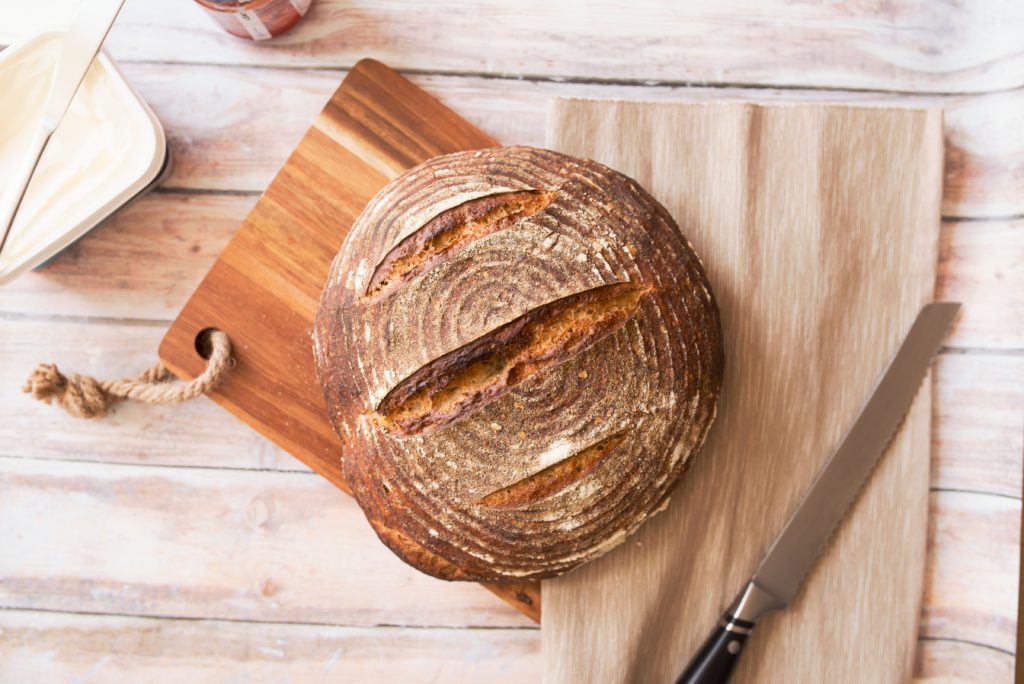What is gluten?
Gluten a protein found in certain grains, specifically wheat, rye, barley, brewers yeast and products made from these grains (including beers, traditional soy sauce, and some lunch meats, soups, and gravies).1
Why is there so much talk about gluten?
- Some people are really allergic to it. One in 141 people in the United States have Celiac disease.2 Celiac is an immune reaction to gluten that results in loose stools, bloating, and poor absorption of nutrients. It’s also associated with a number of other conditions. Celiac patients should avoid gluten, as that will ease symptoms and avoid long term complications.
- There are also people who don’t have a full-blown allergy (standard celiac EMA or anti-tTG antibodies),3 but they avoid gluten for other health reasons. Some people find that avoiding foods with gluten can decrease their IBS symptoms, heartburn, headaches, joint and muscle pain, skin rashes, depression4 and even some neurologic symptoms.5 Even though they aren’t allergic, they still have symptoms, which is usually referred to as ‘gluten sensitivity.’
So why does avoiding gluten help some people even if they don’t have Celiac disease?
There are a few reasons…
-
The Known Associates:
One reason you may feel better avoiding gluten is that a lot of foods containing gluten have a lot of terrible ingredients. Most breads, crackers, and snack foods have vegetable oils in them that mess up your metabolism. Preservatives and dyes can also result in physical symptoms like skin reactions, abdominal pain and diarrhea, breathing problems,6 and hyperactivity.7 If you remove gluten, you may also be eating healthier on the whole and eliminating ingredients that harm your health.
-
Metabolism Changes:
Grains are foods higher in carbohydrate, and carbs raise your insulin levels. If you’re eating lots of carbohydrates, especially simple carbs like sugar or refined flours, your body become less sensitive to insulin.8,9 Insulin resistance results in major health effects throughout the body. It’s linked with more fat storage, increased inflammation levels in your body (think pain and chronic disease),10 and altered hormone levels.11 All of which means you’ll be feeling worse overall. Cutting down insulin-spiking foods like refined grains will make you feel healthier and happier.
-
It makes a bad gut worse:
If there are pre-existing gut problems (infection, damage from poor diet or an undiagnosed food sensitivity), eating gluten can aggravate the issue. Research shows gluten damages the links between that holds the cells in your gut together.12, 13 Since a majority of your immune system functioning takes place in your gut, the worsening situation in your intestines can also alter how you feel because of how it impacts your immune system and also your hormones.14
-
You can also still have an immune reaction to gluten even without Celiac antibodies.
This means you have other kinds of antibodies or your immune system function is already compromised and is responding excessively to foods it should be ok with (i.e. lots of different foods are bothering you).15 This can be due to poor performing elimination or detoxification processes, insulin sensitivity, nutrient deficiencies, or hormone imbalances.
What you really want to know: Should I be avoiding gluten?
Depends on two things: What you’re eating now and whether you really are sensitive to gluten. If you’re eating tons of food with gluten in it, chances are you’re eating a diet consisting of a lot of processed food that has plenty of other problem-causing ingredients. I’d start with cutting out a lot of the sweets, wheats, and whites, since that’s more universally beneficial. If you switch from regular cake to gluten-free cake, you’re still eating cake. Not ideal. It’s better to include more whole foods in your diet, since those are more nutritious and less problematic anyways. If you’re still having issues, you can try avoiding one food (like gluten or dairy) and see if that helps. If most of your problems resolve, that may be your clue that you’re gluten sensitive.
Blood testing for food antibodies may show a food sensitivity. That said, these labs are pricy and show a lot of food sensitivities if the gut is unhealthy.15 I usually recommend cleaning up the diet and healing the gut as needed before ordering one of these tests.
Where to Start:
Some people are all-in types. Some people aren’t. For the ‘all-in’ type, doing a strict elimination diet or Whole 30 and slowly adding back in foods to see your reaction can be beneficial and help you be more body aware. For the rest of people, improving diet by working on incorporating different food choices is a better place to start. After that, eliminating allergens is easier and results of eliminating an actual food allergen are more obvious. I don’t recommend just buying gluten-free bread, muffins, cupcakes or other gluten-free junk food unless you have a sensitivity and are looking to celebrate.
If you find you have an ever-growing list of foods that are giving you symptoms (more than 1-2), there’s some other underlying cause. This could be infection, poor detoxification or elimination, leaky gut, or a nutrient or hormone imbalance. If that’s the case, dietary restriction only gets you so far. Continually eliminating foods you find yourself reacting to won’t stop you from developing more allergies or prevent flare-ups. That’s where making an appointment with a functionally-minded doc helps!
For questions, comment below or get in touch with us. For a few extra comments on eating grains, as well as the sources, click here.

Leave a Reply
You must be logged in to post a comment.